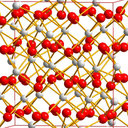Triptolide interferes with XRCC1/PARP1-mediated DNA repair and confers sensitization of triple-negative breast cancer cells to cisplatin.
Từ khóa
trừu tượng
Triptolide is a natural compound isolated from the Tripterygium wilfordii, which possesses anti-inflammatory and anti-tumor activities. Triptolide reportedly inhibits RNA polymerase II-mediated transcription and ATM activities to interfere with DNA repair. However, the roles of triptolide in DNA repair are still largely unknown. Triple negative breast cancer cells (TNBC) are insensitive to targeted anti-tumoral drugs, thus DNA damage chemotherapeutic drugs are the available treatments used in clinic, while the drug resistance of TNBC causes the challenge for successful cure. In this study, we investigated the efficiency of cisplatin in combination with triptolide in treatment of TNBC. 3-(4,5-dimethylthiazol-2-yl)-2,5-diphenyltetrazolium bromide (MTT) assay shows triptolide suppresses the growth of two triple-negative breast cancer cells, BT549 and MDA-MB-231. Triptolide induces DNA breaks and arrests TNBC in the cell cycle S phase, and sensitizes TNBC to cisplatin. Western blot analysis shows triptolide down-regulated the levels of PARP1 and XRCC1, and slightly decreases the levels of RAD51. The results demonstrate triptolide interferes with single strand-break and base excision repair. The over-expressed PARP1/XRCC1 help the TNBC to resist triptolide. Based on these results, we conclude triptolide confers sensitization of TNBC to cisplatin via interference with XRCC1/PARP1-mediated base excision repair.




